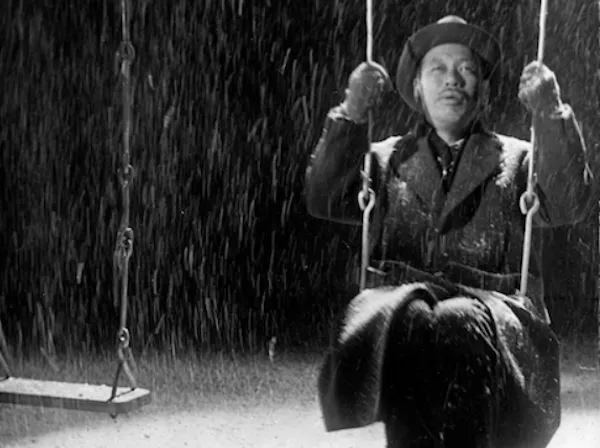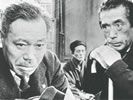Eye For Film >> Movies >> Ikiru (1952) Film Review
Ikiru
Reviewed by: Jeff Robson

Mention the name Akira Kurosawa even now, 10 years after his death, and I’m sure it will conjure up some telling images; the battle in the rain in Seven Samurai, the riders materialising from a forest in Throne Of Blood, Toshiro Mifune’s final showdown in Yojimbo...
All classics, of course, and all referenced and remade by Hollywood over the years, to the extent that it’s easy to pigeonhole him as a director who dealt in epic stories and themes, whose heroes were solitary, self-reliant warriors wandering through the vanished world of feudal Japan. Ikiru (rereleased by the BFI as part of their ‘Japanese Gems’ season), while being as much a five-star masterpiece as any of the above, quite simply couldn’t be more different.

It was deliberately designed to be a contrasting piece to the director’s Rashomon, which wowed the Venice Film Festival in 1951 but began the process of introducing ‘The Emperor’ to Western audiences and cementing the image of him as a director of ‘tales of old Japan’. In fact, he made contemporary pieces throughout his career, but Ikiru was a conscious attempt to provide a view of modern Japan, a country emerging from a horrific war and struggling to find a new identity.
Its protagonist is Mr Watanabe (Takashi Shimura) a civil servant in the Public Liaison department of a minor Tokyo municipality. He has lived a life of uneventful rubber-stamping in a department which, though ostensibly to deal with residents’ complaints and requests, in fact fobs them off to other sections.
Mr Watanabe is happy to be an anonymous part of this inefficient machine. He is a lonely widower with a son on whom he doted as a boy but who has grown up distant and avaricious. His only friend is his somewhat more worldly brother (Makoto Kobori), but essentially his life is his job. Nothing disturbs this dull, comfortable routine – until he is diagnosed with terminal stomach cancer. Brought face to face with his own mortality, he realises what a waste the last 30 years have been and resolves to change. He stops turning up at the office and uses his savings to cram a lifetime’s worth of experience into the few months he has left.
This initially involves a drunken tour of Tokyo’s Westernised nightclubs and strip joints with a dissolute novelist (Yunosuke Ito) whom he’s met in a bar. It gives Kurosawa a chance to create a whirlwind montage of jazz tunes, dancing girls and tipsy salarymen – then bring it to a dead stop with an achingly poignant scene.
Clearly unsuited to a life of debauchery, he next takes up with a former colleague (Miki Odagiri) a young, free-spirited girl who now works in a toy factory – an equally mundane job but one where she can feel “that all the children who buy them are my friends”. His son (Nobu Kaneko) is scandalised – particularly as he’s scared that his inheritance may disappear. But eventually the girl tires of Watanabe’s cloying platonic affection and asks that he stop seeing her. He looks so crushed by this you almost feel he might die of sheer unhappiness on the spot. But then the life comes back into his eyes and he simply says “it’s not too late” and, returning to work, throws himself into a campaign to build a playground taking on gangsters and the establishment in the process.
One can imagine how Hollywood (even at the time) would have treated such a subject – broad, whacky comedy alternating with mawkish sentimentality. Kurosawa avoids both pitfalls, creating instead a subtle, heartfelt portrayal of a man realising his capacity to break free from a self-created role.
Shimura (on screen for virtually the entire film) provides a bravura performance, as do all the supporting cast; many of them would feature in Kurosawa’s later films and in 1954 Shimura took the ‘Yul Brynner role’ in Seven Samurai, a character as different from Watanabe as it is possible to imagine. Credit due also to Kurosawa’s two co-writers, who help to create a Dickensian panorama of Tokyo life.
But in the end what makes this a classic is the direction – stately and assured, with a keen eye for a telling image. The stately pace and sometimes confusing flashback structure (one thing it does share with Rashomon) may be hard work for contemporary audiences but (as Mr Watanabe finds out) hard work can bring rewards.
There may be an element of political comment about Japan’s attempts to throw off its feudal legacy and culture of deference in the face of a changing world running through much of the film. But Ikiru transcends its time and place, becoming Kurosawa’s universal hymn to the things in life that we forget or neglect at our peril - friendship, love, idealism, the innocence and happiness of children – and, of course, the pleasure of a great night at the movies.
Reviewed on: 17 Jun 2008

















